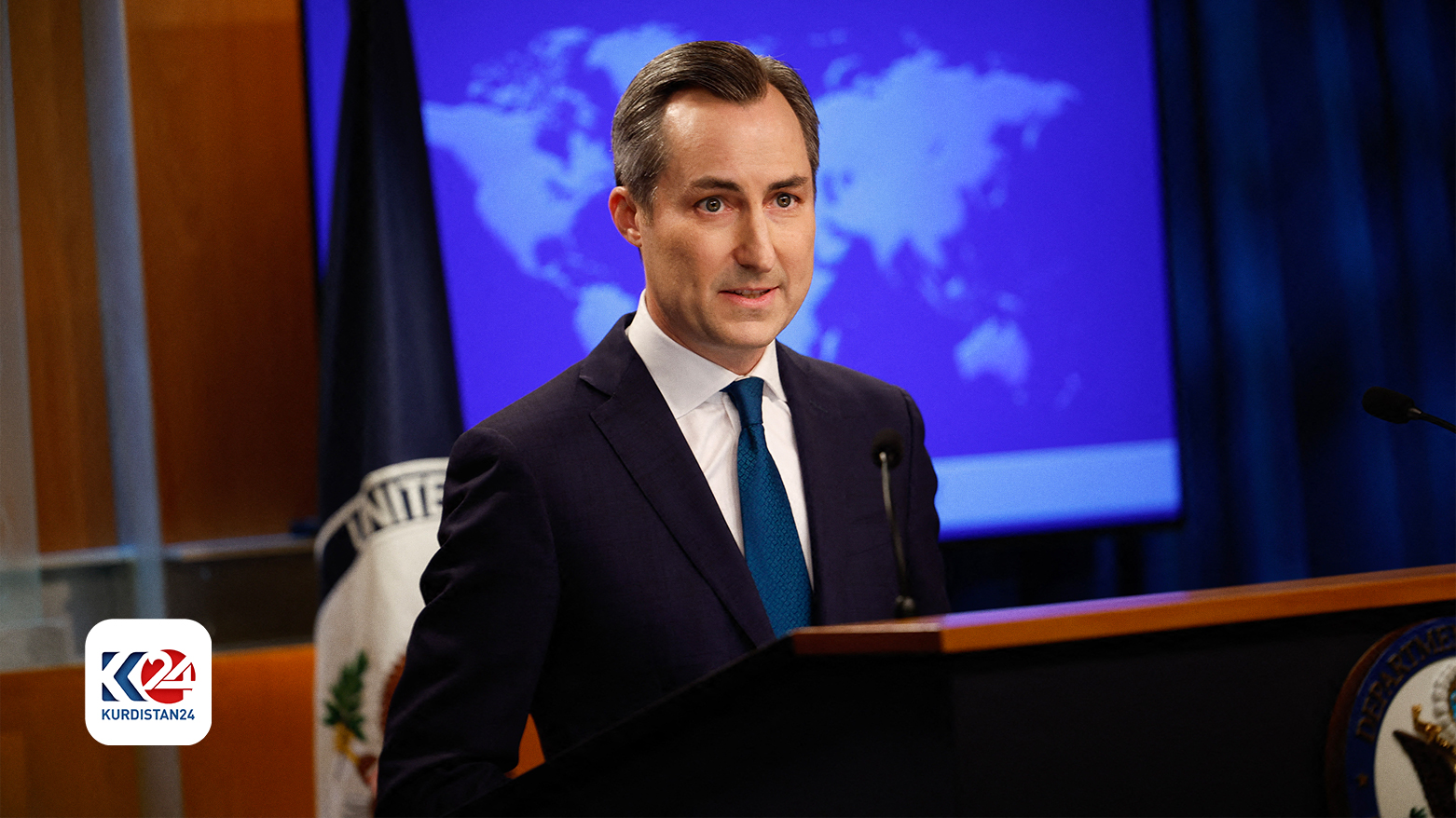US Condemns Iran-backed Militias in Iraq
The militias “destabilize Iraq’s security situation” and “risk Iraq being dragged into a conflict that the Iraqi people want nothing to do with.”

WASHINGTON DC, United States (Kurdistan 24) State Department Spokesperson Matthew Miller, in a press briefing on Monday, strongly condemned the Iranian-backed militias in Iraq as terrorist organizations that destabilize Iraq and the region.
Miller made those remarks in response to a question about the drone attack last week on the Golan Heights, launched from Iraq, that killed two Israeli soldiers and wounded several others.
Miller spoke against a backdrop of brutal exchanges between Israel and its immediate neighbors in Gaza and Lebanon. Any responsible government would seek to stay out of that fight, and the Baghdad government has affirmed that that is, indeed, its position.
Iraq’s Deputy Prime Minister and Foreign Minister, Fuad Hussein cautioned last week at the Defeat-ISIS Ministerial conference in Washington that Iraq must avoid entanglement in those conflicts, particularly as the wars in Gaza and Lebanon could spread instability across the region.
Read More: Iraqi FM urges caution: ‘Iraq must avoid entanglement in the conflicts’
Hamas’s Assault on Israel
The response of Israel to Hamas’s brutal Oct. 7 assault on Gaza has been very harsh—as might have been expected. After all, 1,200 Israelis were killed. Another 251 were kidnapped and taken hostage. And women were raped en masse and sexually abused in other ways that are not suitable for print.
Peggy Noonan, a speechwriter for President Ronald Reagan and now a columnist for The Wall Street Journal, published an insightful commentary a mere five days later. It was titled, “The October Horror is Something New; It was savagery as strategy, and surely calculated to elicit a particular response.”
Israel’s response to Hamas’s assault was largely predictable, and Noonan did predict it, as well as the death and destruction it would likely entail.
Hamas shelters among civilians. Unlike in Western countries, where the military is separated from the general population, Hamas does not maintain military bases. It lives amid the civilian population.
So as Israel has proceeded to attack Hamas to ensure that there can never be another October 7, it is civilians who have paid the biggest price.
The New York Times described the situation on Monday, on the first anniversary of Hamas’s brutal attack, in an article titled, “Gaza in Ruins After a Year of War,”
“The war has left Gaza unrecognizable,” the Times said. “Tens of thousands of people have been killed, and almost everyone living there has been displaced—many of them multiple times,” it continued, “while nearly 60 percent of buildings have been damaged or destroyed.”
Hizbollah Joins in Attacking Israel
To a certain extent, something similar may be developing in Lebanon. On Oct. 8, the day after Hamas’s attack on Israel, Hizbollah joined in, launching guided rockets and artillery into Israel, asserting that it was acting “in solidarity” with Hamas.
Quite possibly, Tehran had orchestrated these assaults. In any case, Hizbollah continued to attack Israel, and some 70,000 Israelis have been evacuated for their safety from the north of the country. In addition, the Israeli government worried that Hizbollah might plot the same kind of attack that Hamas carried out on Oct. 7.
So it resolved to secure control over its northern border and push Hizbollah out of southernmost Lebanon. Indeed, that is stipulated in U.N. Security Council Resolution 1701. That resolution ended a brief war between Israel and Hizbollah in 2006. It was approved unanimously and stipulated that Hizbollah should withdraw to north of the Litani River. But over the years, Hizbollah has moved back into the south.
So Israel is now attacking Hizbollah in Lebanon—not only in the south, but in Beirut as well. And that conflict is not slowing down. Rather, it is expanding. On Monday night, Israel announced that it was sending a fourth Army division into southern Lebanon.
U.S. Condemnation of the Iraqi Militias
Asked about the attack on Israel from Iraq, State Department Spokesperson Matthew Miller responded, “We continue to be concerned about the presence of Iran-backed militias inside Iraq.”
“They continue to destabilize Iraq’s security situation,” Miller continued. “They continue to risk Iraq being dragged into a conflict that the Iraqi people want nothing to do with.”
Indeed, that is what the Iraqi Deputy Prime Minister and Foreign Minister had said in Washington the week before, as noted above.
Thus, as Miller explained, “That’s why we’ve designated these organizations [the Iran-backed militias in Iraq] as terrorist organizations, just as we have other Iranian-sponsored militia groups, such as Hizbollah, such as Hamas.”
“We continue to talk with the Iraqi Government about the importance of preventing attacks from within Iraq’s borders,” he added, “preventing attacks on U.S. personnel, U.S. interests inside Iraq, and the importance of holding people accountable.”
Indeed, Miller’s remarks appeared to confirm a report that appeared Saturday in the Iraqi paper, “Shafaq News.” The report was titled, “Sources: Iraq receives stern warnings from US over militant attacks on American forces, Israel.”
“On Saturday, Iraqi government sources revealed that the U.S. has issued strongly worded warnings to Baghdad following recent attacks by armed factions on American forces at a military base in Baghdad International Airport, as well as escalating military actions against Israel,” it said.
“Various officials in the Iraqi government received messages from the U.S. within the last 48 hours, which were severe in tone and threatened direct action against the armed factions and their leaders if the attacks on American interests in Iraq and the region continue, or if the factions escalate their military operations against Israel,” the report continued, adding that its sources had said “the Iraqi government is taking these warnings seriously.”